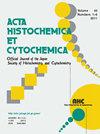Colonic Lymphoid Follicle Hyperplasia after Gastrectomy in Rats
IF 1.8
4区 生物学
Q4 CELL BIOLOGY
引用次数: 0
Abstract
Nodular lymphoid hyperplasia (NLH) of the human colon has been associated with multiple diseases and symptoms. Causes include food allergies, infections, inflammatory bowel disease, and immunodeficiency, and gastrectomy is not usually considered to be the etiology. Nine rats two weeks after total gastrectomy and 12 control rats were sacrificed and submitted for histological examination. In the gastrectomy group, we found lymphoid hyperplasia throughout the entire colon mucosa. The cross-sectional area of lymphoid follicles was increased to be five-fold larger than that in the rats in the control group (sham surgery). Lymphoid follicles were classified into primary and secondary follicles according to the presence/absence of germinal centers; the gastrectomy group had a significantly larger number of secondary follicles. When T cell and B cell classification of lymphocytes was performed, there was no difference between gastrectomy and control groups at T:B = 40:60. When the lymphoid follicles were classified, the proportion of T lymphocytes increased in the secondary follicle (T:B = 40:60) compared with in the primary follicle (T:B = 20:80). Gastrectomy significantly activated lymphocytic intestinal immunity by altering the intestinal environment, causing colonic NLH. Gastrectomy in rats is a good animal model for the study of NLH in colorectal diseases.大鼠胃切除术后结肠淋巴滤泡增生
人类结肠结节性淋巴样增生(NLH)与多种疾病和症状有关。病因包括食物过敏、感染、炎症性肠病和免疫缺陷,而胃切除术通常不被认为是病因。全胃切除2周后处死大鼠9只,对照组12只,行组织学检查。在胃切除术组,我们发现淋巴样增生遍及整个结肠粘膜。淋巴滤泡横截面积比对照组(假手术)大5倍。根据生发中心的有无,将淋巴滤泡分为原发性和继发性;胃切除术组的继发卵泡数量明显增多。当进行淋巴细胞T细胞和B细胞分类时,在T:B = 40:60时,胃切除术组与对照组之间无差异。对淋巴滤泡进行分类时,继发滤泡(T:B = 40:60)中T淋巴细胞的比例高于原发性滤泡(T:B = 20:80)。胃切除术通过改变肠道环境显著激活肠道淋巴细胞免疫,引起结肠NLH。大鼠胃切除术是研究NLH在结直肠疾病中的良好动物模型。
本文章由计算机程序翻译,如有差异,请以英文原文为准。
求助全文
约1分钟内获得全文
求助全文
来源期刊

Acta Histochemica Et Cytochemica
生物-细胞生物学
CiteScore
3.50
自引率
8.30%
发文量
17
审稿时长
>12 weeks
期刊介绍:
Acta Histochemica et Cytochemica is the official online journal of the Japan Society of Histochemistry and Cytochemistry. It is intended primarily for rapid publication of concise, original articles in the fields of histochemistry and cytochemistry. Manuscripts oriented towards methodological subjects that contain significant technical advances in these fields are also welcome. Manuscripts in English are accepted from investigators in any country, whether or not they are members of the Japan Society of Histochemistry and Cytochemistry. Manuscripts should be original work that has not been previously published and is not being considered for publication elsewhere, with the exception of abstracts. Manuscripts with essentially the same content as a paper that has been published or accepted, or is under consideration for publication, will not be considered. All submitted papers will be peer-reviewed by at least two referees selected by an appropriate Associate Editor. Acceptance is based on scientific significance, originality, and clarity. When required, a revised manuscript should be submitted within 3 months, otherwise it will be considered to be a new submission. The Editor-in-Chief will make all final decisions regarding acceptance.
 求助内容:
求助内容: 应助结果提醒方式:
应助结果提醒方式:


